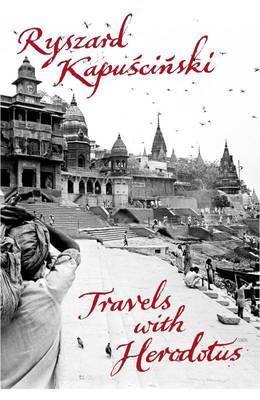
Travels with Herodotus
Seiten
2007
Allen Lane (Verlag)
978-0-7139-9848-1 (ISBN)
Allen Lane (Verlag)
978-0-7139-9848-1 (ISBN)
- Titel ist leider vergriffen;
keine Neuauflage - Artikel merken
As a novice reporter in the 1950's, Ryzsard Kapuscinski wanted nothing more than to travel outside the borders of Poland. This book records how Kapuscinski set out on his first forays - to India, China and Africa.
As a novice reporter in the 1950s, the young Ryzsard Kapuscinski wanted nothing more than to travel outside the borders of Poland. One day, without warning, his editor called him into her office and told him he was being sent to India. `At the end of our conversation, during which I learned that I would indeed be going forth into the world, Tarlowska reached into a cabinet, took out a book, and handing it to me said “Here, a present for the road.” It was a thick book with a stiff cover of yellow cloth. On the front, stamped in gold letters, was Herodotus' The Histories.’
Travels with Herodotus records how Kapuscinski set out on his first forays — to India, China and Africa — with the great Greek historian constantly in his pocket. He sees Louis Armstrong in Khartoum, visits Dar-es-Salaam, arrives in Algiers in time for a coup when nothing seems to happen (but he sees the Mediterranean for the first time). At every encounter with a new culture, Kapuscinski plunges in, curious and observant, thirsting to understand its history, its thought, its people. And he reads Herodotus so much that he often feels he is embarking on two journeys — the first his assignment as a reporter, the second following Herodotus’ expeditions.
Woven into his accounts of his travels are his retellings of Herodotus' epic stories. His whole life as a reporter is a dialogue with what he calls `world literature’s first great work of reportage.’ What kind of restless, enquiring traveller was its author? he asks. `Man is by nature a sedentary creature, settled down happily, naturally, on his particular patch of earth … But to traverse the world for years in order to get to know it, to plumb it, to understand it? And then, later, to put all his findings into words? Such people have always been uncommon.’
How right, and how satisfying, that those words should be among the last written by Ryszard Kapuscinski, the greatest traveller-reporter of our time.
As a novice reporter in the 1950s, the young Ryzsard Kapuscinski wanted nothing more than to travel outside the borders of Poland. One day, without warning, his editor called him into her office and told him he was being sent to India. `At the end of our conversation, during which I learned that I would indeed be going forth into the world, Tarlowska reached into a cabinet, took out a book, and handing it to me said “Here, a present for the road.” It was a thick book with a stiff cover of yellow cloth. On the front, stamped in gold letters, was Herodotus' The Histories.’
Travels with Herodotus records how Kapuscinski set out on his first forays — to India, China and Africa — with the great Greek historian constantly in his pocket. He sees Louis Armstrong in Khartoum, visits Dar-es-Salaam, arrives in Algiers in time for a coup when nothing seems to happen (but he sees the Mediterranean for the first time). At every encounter with a new culture, Kapuscinski plunges in, curious and observant, thirsting to understand its history, its thought, its people. And he reads Herodotus so much that he often feels he is embarking on two journeys — the first his assignment as a reporter, the second following Herodotus’ expeditions.
Woven into his accounts of his travels are his retellings of Herodotus' epic stories. His whole life as a reporter is a dialogue with what he calls `world literature’s first great work of reportage.’ What kind of restless, enquiring traveller was its author? he asks. `Man is by nature a sedentary creature, settled down happily, naturally, on his particular patch of earth … But to traverse the world for years in order to get to know it, to plumb it, to understand it? And then, later, to put all his findings into words? Such people have always been uncommon.’
How right, and how satisfying, that those words should be among the last written by Ryszard Kapuscinski, the greatest traveller-reporter of our time.
Ryszard Kapuscinski was born in Poland in 1932. As a foreign correspondent for PAP, the Polish news agency, until 1981 he was an eyewitness to revolutions and civil wars in Africa, Asia and Latin America. His books include The Shadow of the Sun, The Emperor, Shah of Shahs, Another Day of Life and Travels with Herodotus. He won dozens of major literary prizes all over the world, and was made 'journalist of the century' in Poland. He died in January 2007.
| Erscheint lt. Verlag | 7.6.2007 |
|---|---|
| Zusatzinfo | None |
| Verlagsort | London |
| Sprache | englisch |
| Maße | 159 x 249 mm |
| Gewicht | 516 g |
| Themenwelt | Literatur ► Zweisprachige Ausgaben ► Deutsch / Englisch |
| Reisen ► Reiseberichte | |
| ISBN-10 | 0-7139-9848-2 / 0713998482 |
| ISBN-13 | 978-0-7139-9848-1 / 9780713998481 |
| Zustand | Neuware |
| Haben Sie eine Frage zum Produkt? |
Mehr entdecken
aus dem Bereich
aus dem Bereich
Zweisprachige Ausgabe (deutsch/englisch) / Parallel gesetzter Text …
Buch | Softcover (2024)
Anaconda Verlag
CHF 9,75
Buch | Softcover (2024)
dtv Verlagsgesellschaft
CHF 18,20


